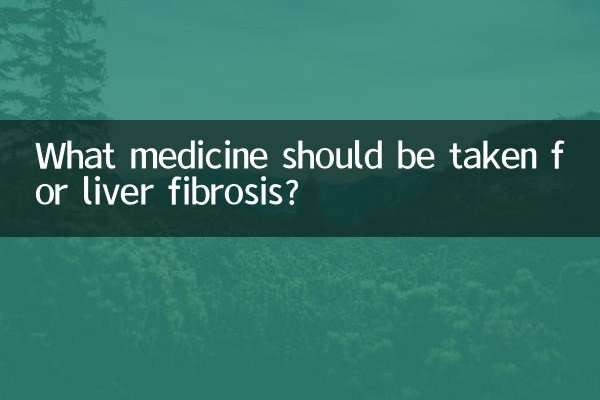What medicine should be taken for liver fibrosis?
Liver fibrosis is a critical stage in the development of chronic liver disease. Without timely intervention, it may progress to cirrhosis or even liver cancer. With the deepening of medical research, drug treatment options are constantly updated. This article will combine the hot topics on the Internet in the past 10 days to sort out the current core medication guidelines and auxiliary treatment suggestions for liver fibrosis.
1. List of commonly used anti-fibrotic drugs in clinical practice

| drug class | Representative medicine | Mechanism of action | Applicable stage |
|---|---|---|---|
| antiviral drugs | Entecavir, tenofovir | Inhibit HBV-DNA replication | Hepatitis B related fibrosis |
| Antioxidants | Silybin, bicyclol | Scavenge free radicals and protect liver cells | early fibrosis |
| angiotensin inhibitor | Losartan, Irbesartan | Inhibit stellate cell activation | moderate fibrosis |
| Chinese medicine preparations | Fuzheng Huayu Capsule | Regulate ECM metabolic balance | Each phase of adjuvant treatment |
2. Recent hot research drugs
1.Obeticholic acid (OCA): The latest clinical trials show that it can significantly improve the fibrosis scores of NASH patients, which has become a hot topic of discussion recently.
2.GLP-1 receptor agonists: Hypoglycemic drugs such as semaglutide have been found to have the potential to improve liver inflammation and fibrosis, and related research has been on the medical hot search list.
3. Medication precautions
| Medication principles | specific suggestions |
|---|---|
| Prioritize treatment of the cause | Viral hepatitis requires anti-virus first, and alcoholic liver disease requires abstinence from alcohol |
| Combination drug strategy | The triple regimen of anti-viral + anti-inflammatory + anti-fibrosis is more effective |
| Monitoring indicators | Check liver function, FibroScan, APRI score every 3 months |
4. Recommendation of adjuvant therapy
1.nutritional supplements: Vitamin E (800IU/day) has been proven to improve non-alcoholic fatty liver fibrosis.
2.diet modification: The Mediterranean dietary pattern has recently become a hot topic in discussions about liver disease nutrition, and it is recommended to consume ≥500g of vegetables and fruits daily.
3.exercise therapy: 150 minutes of moderate-intensity exercise per week can reduce the risk of liver fibrosis progression. This topic continues to be hotly discussed in the health community.
5. Answers to Frequently Asked Questions by Patients
Q: Can Chinese medicine reverse fibrosis?
A: Some traditional Chinese medicines (such as Salvia miltiorrhiza and Panax notoginseng) do contain anti-fibrosis ingredients, but you need to choose regular hospital preparations and avoid using folk prescriptions with unknown ingredients.
Q: What progress has been made in the research and development of new drugs?
A: Recently, biological agents targeting TGF-β, PDGF and other targets have entered Phase II clinical trials, and relevant reports have attracted widespread attention in medical journals.
Conclusion:Drug treatment of liver fibrosis requires an individualized plan. It is recommended that patients combine etiological treatment and lifestyle intervention under the guidance of a specialist, and regularly monitor changes in the degree of fibrosis. The latest research shows that early and standardized treatment can reverse fibrosis in 40% of patients.

check the details

check the details